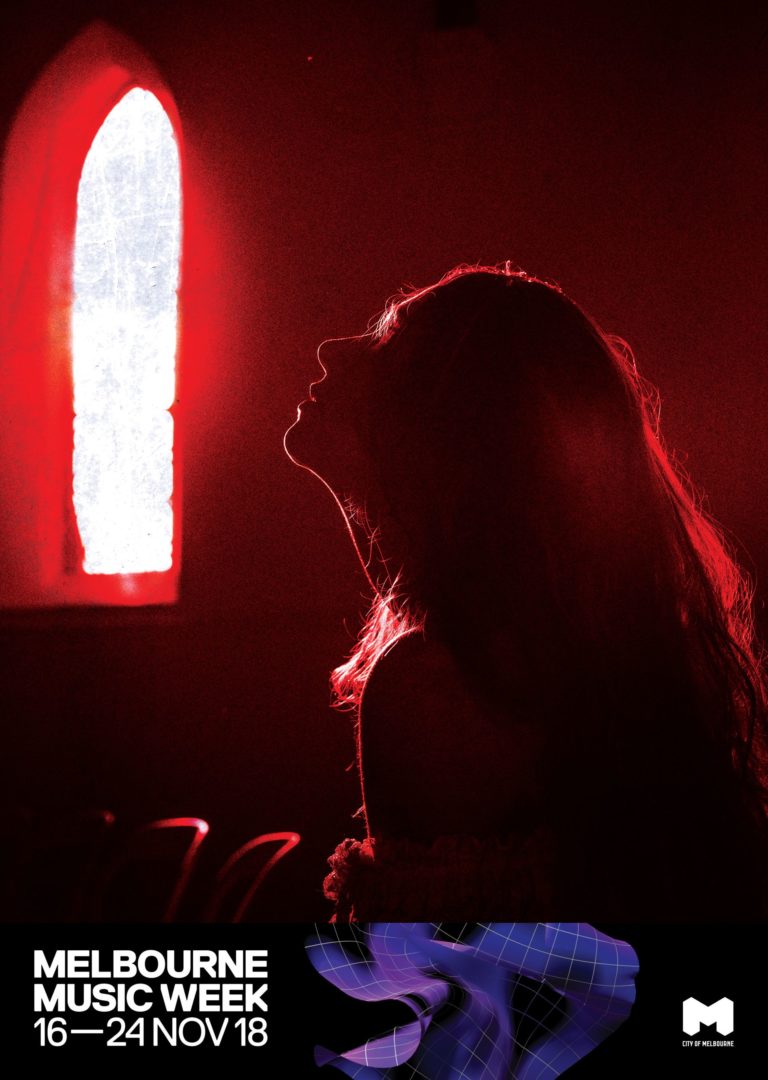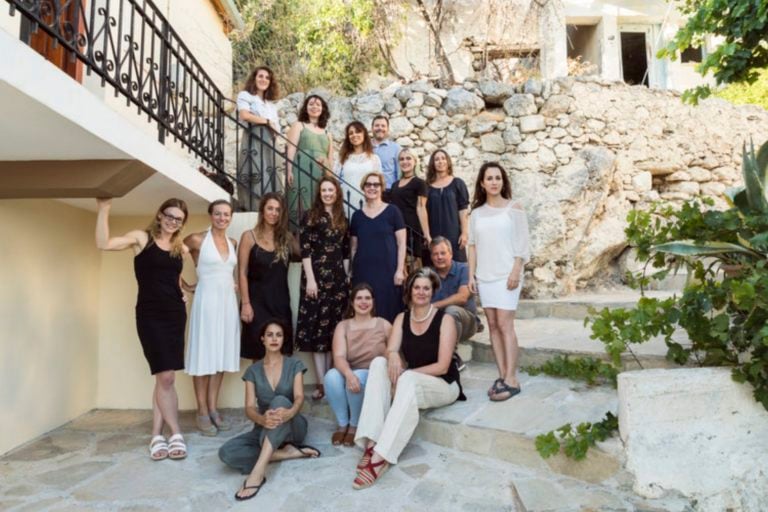To say that Antigone is one of the most enduring characters of fiction, her perennial relevance confirmed throughout the centuries, would be both an understatement and a pleonasm. After all, the ancient Greek tragedies are called ‘classics’ for a reason. Still, Sophocles’ seminal heroine seems to be more relevant today than ever, her fearless stance against patriarchy finding a direct link to the #MeToo era. Setting the myth against this context, pianist and composer Rose Riebl set out to reimagine Antigone, stripping her to her bare essence, her actions, emotions and intellect. An adventurous and inquiring mind, the composer, along with sound designer Grace Ferguson and dancer/ choreographer Lilian Steiner, deconstructed and recreated the tragedy as a kind of abstract ballet, a music and dance performance, featured at the Melbourne Music Week.
Speaking to Neos Kosmos, the composer describes how she turned Sophocles’ words into music.
How did Your Heart’s So Hot O Sister: Antigone Reimagined come to be?
I grew up loving ancient myths, especially stories of the Greek gods, heroes, heroines. Earlier this year my friend and colleague, sound designer Grace Ferguson showed me a recent translation of Antigone by American poet, writer, scholar Anne Carson. It was the best translation of a Greek play I’d ever read, with a distinctly female voice for Antigone, language that was complex but also modern. Grace and I wanted to turn it into some kind of performance and so together, we started imagining what that might look like.
How did you work on this project?
We spent a lot of time reading, chatting, debating. Earlier in the year we flew to Greece together, where I completed an artist residency and Grace drove around the island collecting field recordings of cicadas, oncoming storms, stray dogs, protests. Even though our reimagining of Antigone isn’t necessarily set in Greece, this sourced material pays homage to the original play by Sophocles and history and transmutation of Greek Tragedy. We have both worked very independently on our different crafts but come back together to explore who Antigone is, how we feel we are or aren’t like her, who she might be today. It has been an interesting challenge to explore a character who is famed for her voice, for not being silenced, and trying to express this without using words. Instead this performance uses music, sound and dance to explore the internal world of Antigone; it’s not theatre and there are no other characters with her on stage, it’s very much an expression of her experience.
How does the story of Antigone translate into music?
It’s been a wonderful process translating Antigone into music. I was really interested in her extreme mood states, the physicality of her rage and defiance, and then her very poignant, almost childlike states of vulnerability. Piano is an amazing instrument to write for and perform on, precisely because it is so physical and has such a breadth of sound and storytelling capacity. I can literally do battle with it, playing furiously loud and fast and then bringing it back to a sparse and lonely sound that echoes a human voice. In terms of Grace’s sound design, the use of field recordings provides us with a backdrop, a fuller silence. These soundscapes are important in the work because they aren’t trying to explicitly evoke an emotional response, rather they create space for the audience to sit with familiar yet evocative sounds. This helps to situate the story but also allows an audience to empathise with Antigone’s experience of the world.
How would you describe your music to someone that’s not familiar with it?
It’s cinematic, moody and minimalist. It’s inspired by many years studying and performing classical music, and loving contemporary, electronic artists. Reviewers have described it as ‘reminiscent of films by Kubrick’, ‘melancholy’, ‘music for the borderlands’; it’s ambient and I hope transporting. When I write I try and create a new landscape, open a door for the audience to step through and take them somewhere else for the duration of the show.

The dance element is brought into your project by Lilian Steiner; how did you work with her?
Lilian is a really sensitive and beautiful artist. She is Antigone’s limbs and movement and body. Grace and I have been imagining Antigone into her existence over the past months, but Lilian is breathing her to life. I feel very lucky to be performing with such a talented dancer. Lilian has an incredible gift for embodying the powerful and the delicate, which I think is so important for Antigone. It’s a challenging but deeply rewarding collaboration across two different art forms, which requires trust and improvisation and Lilian’s hypnotic and very powerful art.
Antigone is the story of a woman standing up against patriarchy. What is the significance of Antigone in the context of modern day Australia and the #MeToo era?
When Grace and I first started discussing this project, it was at the height of the Weinstein scandal, which then led to the unearthing of many similar cases around the world, dealing with abuses of power and boundaries crossed; cases which many people had previously known about, but suddenly now there was a platform for their voice to be heard. In Australia, the most newsworthy of these has being Eryn-Jean Norvill speaking out against actor Geoffrey Rush for an incident that occurred during STC’s production of King Lear in 2015. Despite her desire to deal with this internally, she was thrust into the public sphere when the Sydney Daily Telegraph published the confidential allegations against Rush. Consequently, Rush filed a defamation lawsuit against the newspaper and Norvill was asked to give evidence to support the claims published. She didn’t initiate the lawsuit but has spoken out, on public record against him because it is her right to speak the truth she knows. This standing up against the patriarchy comes at great personal cost and this is what we wanted to explore in our reimagining of Antigone. What internal states are experienced when a woman decides to speak out? Fear? Isolation? Judgement from others, judgement of oneself? Are they forced to take on qualities that they wouldn’t normally if they weren’t in this position? Antigone is often presented to us as this strong-willed, unbending character and while she is a woman with tremendous courage, some of her intensity is surely also an armour she’s built to protect herself. Speaking out comes at a cost, and there are several battles being fought – internally and externally. We were interested in the price she pays, and the burden of the grief she carries throughout her battle with authority. We wanted to present her with more nuance, which is important to remember in the context of the #MeToo era, we as humans are nuanced.
In your opinion, who is a modern-day Antigone?
There are parts of Antigone present is in all of us. Some exercise her frequently, in others she might lie dormant for a lifetime. Most women you speak to will have an ‘Antigone’ moment, where they have spoken out against authority, or felt they couldn’t, where a clash has arisen and you suddenly question what power you have, and if there is a chance for recall or witnessing. If you speak, will anyone listen? What will be the consequences? Will you be told to be quiet, or careful? During a lifetime, we all have moments where our internal compass will contradict the boundaries set for us by our parents, government, culture or society.
What does Antigone mean to you personally? How has this project affected your perception of this myth?
That’s a really interesting question, I’m glad you asked it. Actually, my relationship with the play has changed quite significantly over the course of the last few months. Initially I felt connected to her because she was wild, free, bold and vulnerable; defiant in the face of a patriarchy which refused to allow her a voice, unwavering in her love of her brother. I still believe she’s a wonderful emblem of a bold and fierce woman, but there’s been a softening. I feel like the complexity and subtlety of the play lies in the quiet moments of grief, her love for her brother, the grief of losing him, of losing her father, Haimon’s love for his father, Haimon’s love for Antigone, the very sad impossibility of it all, the loss, and then the brief moments of hope. I hope our version of Antigone reflects all of this.

You mentioned doing an artist residency in Greece; what was this experience like?
I was at Mudhouse residency in Agios Ioannis, in Crete. It was a stunning, very magical, half abandoned mountain-village, which you accessed by getting a lift up a winding path, about three km from the sea. It was extraordinary to walk through the hills each day, with clouds and grass sometimes overlapping; the sound of church bells and goats, a wild storm one day and still, heavy heat on others. I had a beautiful piano to play and compose on and because the town was so quiet the other artists and townspeople said they could hear the piano echoing through the cobbled streets and out into the hills. I like that image, the faint sound of a piano far away. I’ve been to Greece many times and feel such a deep affinity for the place, I love the earth and energy there. This residency was my first time on Crete and first time in this very high, mountainous terrain and it was so beautiful. The residency was self-led and while we had access to activities and resources, we were also free to do our own work in our own time. At the end of the time there we had an exhibition of the artworks created and I played a recital in a beautiful high-ceilinged room which was filled with locals and other artists. I found lanterns and rocks and Grace picked wild aniseed flowers and we filled the dark room with candles, it was a really special experience. I’m sure this land and my time there has made its way into the music.
‘Your Heart’s So Hot O Sister: Antigone Reimagined’ is being presented on Saturday 17 November at the Church of all Nations (180 Palmerson St, Carlton, VIC) at 8.00 pm. For more information visit https://mmw.melbourne.vic.gov.au/; for tickets, go here.









